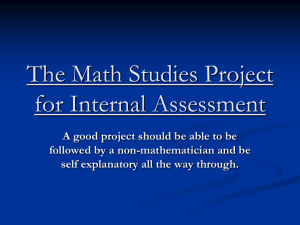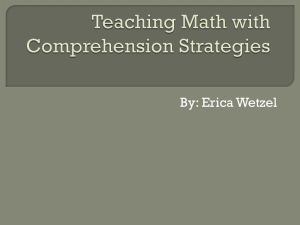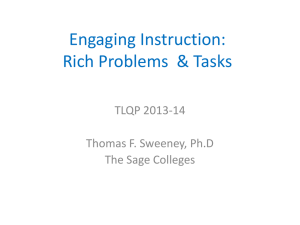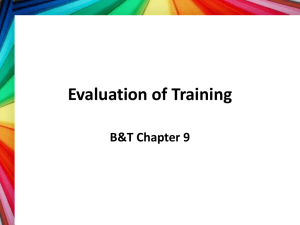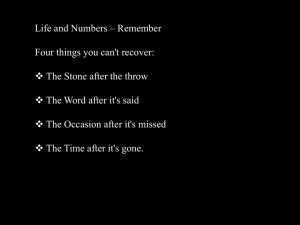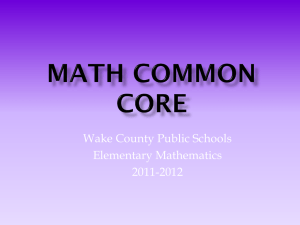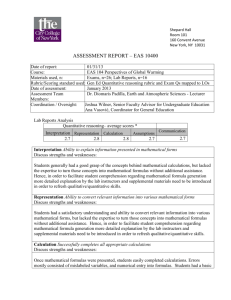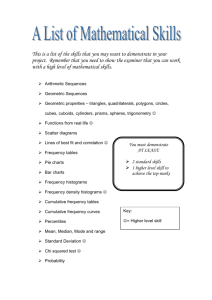Project Presentation Power Point
advertisement
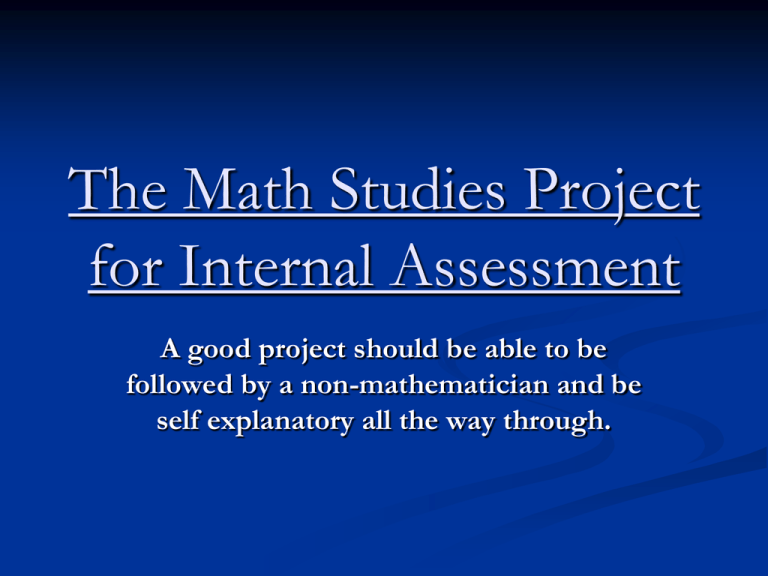
The Math Studies Project for Internal Assessment A good project should be able to be followed by a non-mathematician and be self explanatory all the way through. Length The project does not have a word limit. It is the quality of the mathematics and the processes used and described that is important, rather than the number of words written. However, the student is expected to put in the required time allocated for the project. A simple project does not receive many marks. Commitment The project is a substantial piece of work (25 hours class time plus many more hours outside the class) The project should demonstrate a commitment of time and effort by the student Choice of Topic The choice of topic must give students sufficient scope to demonstrate their mathematical ability. Statistical Chi-Squared test for Independence Correlation/Linear regression Normal distribution Student ‘t’ test Spearman’s rank order correlation Choice of Topic Algebraic Modelling Quadratic Exponential Trigonometric Calculus i. Optimization Problems ii. Modelling Choice of Topic Number and algebra i Sequences and series ii Linear programming Sets, Logic and Probability i Venn diagrams ii Probabilities Financial Mathematics Title page The Project must have a clear title Candidate’s name Candidate’s number Date Subject Teacher’s Name Table of contents Page numberring where each part of the project can be found A: Introduction Task: What is the aim of the project? The task must be clearly stated and any relevant background information given. Plan: What must be done to achieve this aim? Include as much detail as is necessary to be clear Include a description of the method of data collection, including any sampling techniques State what techniques are to be used at each stage and the reason why these techniques are being used Remember to do exactly what you state in your plan B: Information / Measurement The information/measurements collected may come from a survey, internet, calculation, etc All sampling processes should be completely described The information/measurements must be sufficient in quantity When the information/measurements is to be split, as in the chi squared test, more than 50 pieces of data is necessary to avoid small expected values, rendering the test invalid. The information/measurements must be relevant The information/measurements must be organised The information/measurements should be reorganised each time, to suit calculations being done eg. Male, female categories If a questionnaire is used then include this in the project A questionnaire should be designed to collect multidimensional mathematical data. This will ensure the quality of the data. Raw data must be included to determine the accuracy of calculations. If the raw data is not included then the moderator cannot check the accuracy of the mathematical processes used. C: Mathematical Processes Include at least two relevant simple math processes. If there are no simple processes then the first further process will be counted as simple. If there is only one simple process then the next further process will be counted as the second simple one. Calculations performed only using technology are counted as simple. It is important that the simple processes are relevant otherwise no more than 2 marks can be awarded for this criterion. C: Mathematical Processes • What is the mathematical process used? Give an explanation of mathematical process used. • Why is this particular process useful? • What is the relevance/validity of the mathematical process? • Always state formulae used and do one calculation by hand. The GDC can be used to perform further similar calculations. • Always check the accuracy of your results • Interpret your results/draw conclusions from the results of the calculations C: Mathematical Processes Apply relevant further processes as thoroughly as for simple process. For Chi-squared tests to be valid: Make sure that you always perform the calculation once by hand before using technology. Interpret the results/draw conclusions from the results of the calculations Comment on the validity of the results Check the accuracy of the results Frequencies must be used, not raw data or percentages All of the expected cells should have a number more than 5 If the degree of freedom is 1 then Yates continuity correction must be applied. For Linear correlation There is no point in finding the correlation coefficient or regression line if the scatter graph shows that there is no correlation D: Interpretation of results Always give a thorough and detailed analysis and discussion of results All the interpretations and/or conclusions must be consistent with the processes used. If the project is very simple then full marks cannot be awarded for this criterion. E: Validity Validity of mathematical processes used Validity of results obtained from these processes Recognise any limitations that might apply Make a realistic suggestion for improvement If the candidate feels that validity is not an issue then this needs to be fully justified. F: Structure and Communication The project should include discussion in the body of the work The project should be presented correctly and in a systematic manner. The project must reflect an appropriate commitment in order to receive more than 1 mark for this criterion. All sources should be acknowledged Include website addresses in bibliography Include raw data in body of document or in appendix E: Notation and Terminology Make sure that all variables are defined Make sure that all the mathematical notation is correct Make sure that all the terminology is correct A simple project with little or no notation and terninology cannot receive more than 1 mark for this criterion. Conclusion Did the data and calculations support your task? Have you done everything that you said you would in your plan? Discuss any limitations and its applicability within the project. Mention any scope for improvement /extension of your project Bibliography State websites Footnotes as necessary Other sources of information such as books, magazines, etc. Appendices Raw data collected can be placed here
